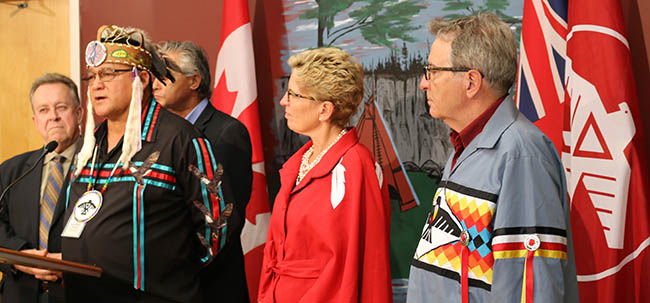Summit helps Anishinabek move forward on key issues

By Marci Becking
FORT WILLIAM FIRST NATION — Anishinabek Nation leadership, Premier Kathleen Wynne and eight cabinet ministers and members met Aug. 26 in Fort William First Nation for an historic Anishinabek-Ontario summit.
“We’ve been working with Ontario on a number of issues,” said Anishinabek Nation Grand Council Chief Patrick Madahbee. “Sometimes it’s the small successes that keep us moving forward in the right direction. Our discussions are all done in the context of a treaty relationship.”
Premier Wynne says that this summit is an example of regional discussions that will continue to take place, referring to the Political Accord that was signed on Monday at Queen’s Park with Ontario Regional Chief Isadore Day.
“Ontario has a commitment to creating a fair society,” said Premier Wynne. “Real progress can only happen if we work together.”
Highlights of the summit include Health Minister Hokins commitment to engaging communities to work in partnership with the province to combat prescription drug abuse. Child and Youth Services Minister MacCharles made a commitment to Sudbury’s Fetal Alcohol Spectrum Disorder diagnostic centre and says the Ontario is ready to implement the Anishinabek Nation Child Well-Being Law.
Deputy Grand Council Chief Glen Hare said that he would like to see money currently spent by the province put to better use.
“I would like to see the millions of dollars going to fighting in the courts over child welfare to be put towards bringing our kids home,” said Hare.
Wikwemkong Unceded Territory’s Ogimaa Peltier reminded everyone that there are more First Nation children in care now than were ever in residential schools.
The Minister of Aboriginal Affairs, David Zimmer, announced funding to the Union of Ontario Indians for continued work on the bi-lateral table process and Education Minister Sandals is supportive in closing the gap for First Nations education and the Anishinabek Education System.
Northern Superior Regional Chief Pierre Pelletier expressed his concerns to the Premier about hydro rates.
“Hydro rates for our First Nations are putting our citizens in poverty,” said Chief Pelletier.
Minister of Economic Development, Brad Duguid said that he acknowledges the gaps in resource benefit sharing and will work together with the Anishinabek Nation leadership on this matter. He also noted the reality having to educate the growing First Nations youth population.
“We cannot be globally-competitive if the fastest growing population in Ontario is not getting the training and education,” said Minister Duguid.
Other topics at the summit included gasoline and tobacco tax, prescription drug abuse and community emergency response plan development.
The Anishinabek Nation is made up of 39 First Nations in Ontario and this summit was represented by 33 of them.


